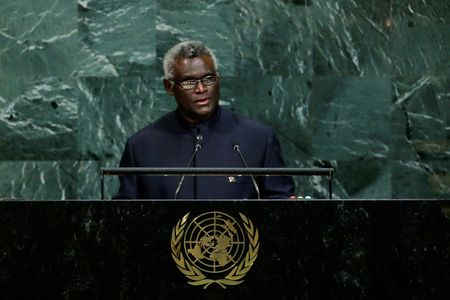By Kirsty Needham, David Brunnstrom and Michael Martina
SYDNEY/WASHINGTON (Reuters) – The Solomon Islands has told Pacific nations invited to a White House meeting with President Joe Biden it won’t sign the summit declaration, according to a note seen by Reuters, prompting concern over the islands’ ties to China.
Leaders from the Pacific Island Forum bloc have been invited to the two-day White House summit starting Wednesday, at which the Biden administration seeks to compete with China for influence in the strategically important South Pacific.
The Solomon Islands, which struck a security pact with China in April, wrote to the Pacific Islands Forum and asked it to tell the other members it wouldn’t sign a proposed Declaration on the U.S.-Pacific Partnership, to be discussed at the summit on Sept. 29, and needed more time for its parliament to consider the matter, according to the note dated Sunday.
Federated States of Micronesia President David Panuelo said on Tuesday in Washington that countries had been working on the summit declaration – “a vision statement” – that would cover five thematic areas, including human-centered development, tackling climate change, geopolitics and security of the Pacific region, commerce, and industry and trade ties.
The Solomons note said the declaration was “yet to enjoy consensus”.
“Solomons does state it won’t be able to sign the declaration but it doesn’t call on others to follow suit,” said Anna Powles, a Pacific security expert at New Zealand’s Massey University who has seen the note.
Solomon Islands Prime Minister Manasseh Sogavare’s office did not respond to a request for comment. A spokesperson for the White House National Security Council declined to comment.
Solomon Islands opposition party leader Matthew Wales wrote in a tweet: “Strange inconsistency. Agreements with China are signed in secret & kept secret. Now insisting Parliament must deal with the regional agreement with the US? Insincerity writ large!”
The Solomon Islands says in the note, signed by its embassy in Washington, that the Pacific Islands Forum already has a mechanism for engaging with partners outside the region.
“Of course, China is a part of that mechanism, hence the U.S. seeking to create alternative architecture such as its own regional partnership framework,” Powles said.
Speaking at an event in Washington hosted by Georgetown University, Panuelo said the Pacific island nations had come to realize the importance of “strength in numbers” and called for superpowers to talk to them about the issues most important for the region.
Efforts to reach a final text on the declaration ran into problems this week during a call between the U.S. State Department and Pacific islands ambassadors, when the U.S. side demanded removal of language agreed to by the island countries that Washington address the Marshall Islands’ nuclear issue, three sources familiar with the call, including a diplomat from a Pacific island state, told Reuters.
(Reporting by Kirsty Needham, David Brunnstrom and Michael Martina. Editing by Gerry Doyle)





